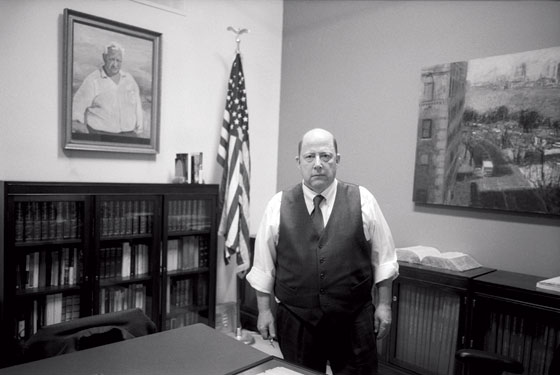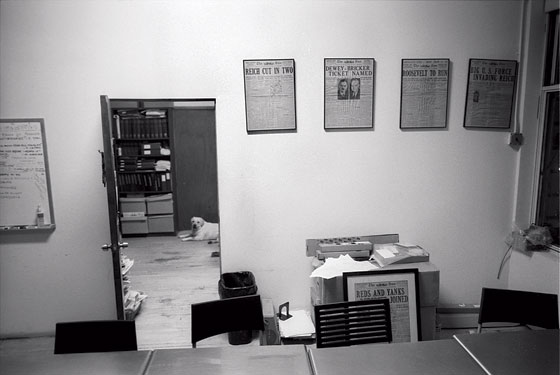
Last Monday, on what must have been the worst day in recent memory to find funding for anything, New York Sun editor Seth Lipsky was trying to save, of all things, a broadsheet daily newspaper. On September 4, the paper had published a letter by Lipsky outlining the paper’s financial woes. Plainspoken and unflinching, it announced that should new funding not be found, the Sun would close at the end of the month.
“Our losses, which are substantial,” Lipsky wrote, “have been covered so far by a group of investors whom we would call heroic.” It would seem, however, that after seven years and reported expenditures of more than $100 million, it was more the losses that were heroic. The paper’s crusading conservatism was dear to its backers, and in the recent neo–Gilded Age New York, much wealth had been put to long-shot use. But the Sun was losing more than $1.5 million a month, and its cadre of right-leaning Jewish investors—Michael Steinhardt, Roger Hertog, Bruce Kovner, and Thomas J. Tisch—were unwilling to pay to keep the house organ playing.
“It was really starting to wear on us a little,” says Michael Steinhardt, a retired money manager. “What we needed, as a minimum, was an investor or a group of investors who would contribute $10 million per year, to be matched by the current group of investors. That would give us about $20 million, which is what we were losing.”
And so Monday loomed as perhaps the Sun’s final day of operation. In the preceding weeks, Lipsky had been frantically taking meetings and phone calls in hopes of a last-minute cash infusion (looking as far afield as Bernard-Henri Lévy). Even at midday, he reported to his staff that there was still “an active effort being made to save the paper.” But as the afternoon wore on, with still no word from their editor, the Sun staff became increasingly anxious. In an ominous coincidence, Congress rejected the Wall Street bailout, and the stock market plummeted. It seemed a symbolic sigh at the end of a tense month. Lipsky came from his office into the newsroom to give the bad news: The paper would fold.
“We couldn’t have had a worse time,” says Steinhardt of the financial climate surrounding Lipsky’s last push for cash. But the Sun was also born at an inopportune moment. It started staffing a month after 9/11, in the depths of the city’s last recession and at the beginning of the precipitous decline in print media that has threatened the fates of newspapers around the country. The Web 2.0 ethos was taking hold in the newspaper world, and it was becoming clear that not only were print editions costly but Websites were in fact a more immediate way of breaking news—a notion that found traction with the performance of the New York Times home page on 9/11.
Lipsky was out of step; he had apparently missed his journalistic era by a generation. What he had in mind was not just a daily broadsheet but a resurrection of a New York paper that had existed from 1833 to 1950. Lipsky even tried to secure the offices of the old Sun for his reanimated version. (The paper later settled at 105 Chambers, where the rent was exceedingly cheap in the wake of the World Trade Center’s destruction.)
Nevertheless, he was able to raise money for the paper, an achievement met with some bewilderment by media observers. New Yorker senior editor Hendrik Hertzberg has followed his career since Lipsky founded the English-language version of the Forward in 1990. “I was flabbergasted that he was actually able to play out his boyhood fantasy,” says Hertzberg, “which was to be a shirtsleeved New York newspaper editor, down near Park Row, getting that story and stopping the presses.”
From the beginning, the Sun was an advocacy paper, its editorial position combining the economic leanings of Adam Smith with the hawkish foreign policy of Menachem Begin, whose portrait Lipsky painted and displayed in his office at the Forward. Its neocon politics aside, the Sun was renowned for its cultural coverage, book reviews in particular, as well as its sports pages, done with a much smaller staff than its competitors. The crossword was considered by many a rival to the Times’.
Lipsky is known for cultivating young talent and has referred to himself as a journalistic “horse buyer.” Among those who have worked for him at either the Forward or the Sun are Philip Gourevitch, now editor of The Paris Review; Jonathan Mahler, a writer for The New York Times Magazine; Rachel Donadio, Rome bureau chief of the Times; and Jeffrey Goldberg, a national correspondent at The Atlantic.

“He has a singular ability to make that type of working hard be really exciting,” says Vanity Fair writer Seth Mnookin, who worked for Lipsky at both the Forward and the Sun. “When you’re working with him, you feel like it is the era of The Front Page and His Girl Friday. One time when I was at the Forward I went in to his office to talk about a job, and he said, ‘Well, it’s clear that what we need to do is get you a three-piece suit. No reporter should be without a three-piece suit.’ Literally, we went down to Cambridge Clothiers and he bought me a three-piece suit. And at another point he took me to J.J. Hat Center on Fifth Avenue. Because he came in one day to the office and was like, ‘Mnookin, what are you doing? Where’s your fedora?’ ”
Many of Lipsky’s trappings can be somewhat amusing, as if he has been called up from central casting to play a gentlemanly, tumbledown big-city editor. His office is lined with barrister bookcases filled with bound volumes of the old Sun, and he sits behind what looks to be a vast desk but is actually two tables covered in a green felt cloth. He always wears a suit, and he expected his reporters (even his interns) to be well turned out as well. But Lipsky’s emphasis on proper dress is something more than a sartorial holdover. “It’s designed to instill in these young men and women a sense of pride at being a newspaperman,” he says. “It’s a serious calling. I don’t want them walking around in here in overalls, with their shirts untucked. They have to be assignable.”
Indeed, Lipsky believes strongly in the idea of the journalist as historical actor. It is significant to him that Theodor Herzl was a journalist, and he thinks the Forward, in its original Yiddish iteration, went a long way toward winning the Cold War. If asked what precipitated the fall of the Berlin Wall, Lipsky will say that in part it was a single question posed at a press conference by Daniel Johnson, later the Sun’s London correspondent. (As Lipsky tells it, Johnson stood up and asked Communist Party official Günter Schabowski simply, “Herr Schabowski, what about the Wall?” When Schabowski clumsily answered that the Wall would become an artifact of history, thousands of East Berliners, watching the coverage live, streamed from their living rooms to pull the Wall down.)
“He really believes that newspapers are weapons that defend the country just like other armaments,” says former Sun books editor Thomas Meaney. “Seth would I’m sure say, ‘Yeah, I’m ideological, but it’s for us.’ There’s a real sense that ‘they might have Al Jazeera, but we have the Sun.’ ”
Peter Kann, former publisher of The Wall Street Journal, who has known Lipsky since the two were reporters in Vietnam, sums up his friend’s worldview as “Free markets. Free people.” True to form, in its penultimate edition, the Sun ran two unsigned editorials, one urging a continuation of aggressive foreign policy in the Middle East, the second a further condemnation of the Wall Street bailout as government meddling in the business of capitalism. Even as capitalism made its margin call on the Sun.
At about 4:15, microphone in hand, Lipsky called the staff together and read from prepared remarks. He congratulated and thanked them for their years at the paper, and mentioned prominent people who had sent their regards, including Mayor Bloomberg and Cardinal Egan. He also made a nod toward posterity, saying, “All of you will be able to tell your children and your grandchildren or simply your friends that not only did you appear in arms in a great newspaper war but that you did so on your own terms, for principles you believed in.” As the speech concluded, the newsroom broke out into spontaneous applause.
The outcome was hardly a surprise, but Lipsky had pulled off fund-raising coups before. There had been a chance. (“There are all sorts of people in this city who purport to love reading the Sun who could easily have said ‘I want to be part of this,’ ” says Steinhardt.) But in the end, there was no help to be found. The staff would be paid two months’ severance, along with health benefits through the end of the year.
After Lipsky left the newsroom, the staff dispersed. There was some sentimental looting, with reporters taking Sun memorabilia for their apartments. A group of staffers and former staffers (technically, they were now all former staffers) headed to a local bar, on the way stopping to inform a waiter at Edward’s that they wouldn’t be in for meals any longer. Those responsible for the next day’s paper returned to their desks. Lipsky, who had gone back to his office to write his last words for the New York Sun, was hammering away on his keyboard. He looked up from his work only to say, “I can’t talk now. I’m on deadline.”
Have good intel? Send tips to intel@nymag.com.